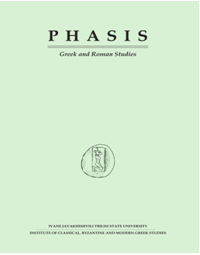König Vaxtang Gorgasali zwischen Legende und Geschichte
King Vakhtang Gorgasali between Legend and History
DOI:
https://doi.org/10.60131/phasis.27.2024.9063Abstract
King Vakhtang Gorgasali is a central figure in the historical tradition of Georgia, as we encounter him in particular in the chronicle of Kʽartʽlis Cʽxovreba. In this, his profile unites opposites that are difficult to harmonize: Vakhtang Gorgasali is a great fighter, but ultimately succumbs to the Persians. He is a powerful ruler, but equally functions as a vassal of the Sasanian Great King. He was a zealous follower of Christianity but maintained ambivalent relations with the Byzantine emperor and strove for ecclesiastical autocephaly.
Researchers have long noticed that Vakhtang Gorgasali, as prominent as he appears in the Old Georgian tradition, is not mentioned at all in the Greco-Roman sources (unless one wants to identify the Gurgenes mentioned in Procopius’s Bella with him) and in the Old Armenian historiography only by one author (namely Ghazar Parpetsi). The paper is not so much about substantiating the historicity of the famous king and elaborating on its details, but rather about describing his contradictory profile in the Old Georgian tradition and fathoming the origin of the individual aspects that compose it. In the process, it will be shown, among other things, that Old Georgian historical thought of late antiquity and the early Middle Ages owes at least as much to the principles of Iranian historical tradition as it does to classical ancient and Old Armenian historiography and to Christian church historiography in the tradition of Eusebius of Caesarea.
Downloads
Published
Issue
Section
License
Copyright (c) 2024 PHASIS

This work is licensed under a Creative Commons Attribution-NonCommercial 4.0 International License.


